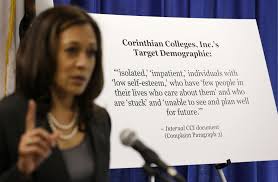In late April, Corinthian Colleges, administrator of the Everest College, WyoTech and Heald College campuses, abruptly closed its California sites, leaving more than 10,000 students out in the cold.
 As described by Chris Kirkham, most of the students engaged in Corinthian’s vocational classes find themselves with no clear path to training completion. The federal government will lose at least millions of dollars of government-insured education grants.
As described by Chris Kirkham, most of the students engaged in Corinthian’s vocational classes find themselves with no clear path to training completion. The federal government will lose at least millions of dollars of government-insured education grants.
A narrative quickly formed in the media that placed the blame for the Corinthian debacle on greed and weak government regulation. Corinthian, it was said, was allowed to get away with predatory marketing to low income students, benefiting from the federal government’s disinterest in the high student default rates. No surprise, an op-ed by a senior official at the New America Foundation took a partisan angle blaming George Bush, and the Bush Administration policies of deregulation.
In fact, weak regulation did play a role; though the failure was at least as great in the Obama Department of Education as the Bush Department. Both were co-opted for years by the industry lobbyists. The only heroes in the Corinthian debacle have been the attorneys at the California Attorney General’s office who refused to turn a blind eye to Corinthian’s faux education schemes.
 But the true meaning of Corinthian Colleges goes beyond the lax government regulation. Corinthian Colleges existed at root because it responded to an educational demand that the public higher education system in California did not, and still does not. It provided career technical education to students through the still-conventional career technical programs at California community colleges.
But the true meaning of Corinthian Colleges goes beyond the lax government regulation. Corinthian Colleges existed at root because it responded to an educational demand that the public higher education system in California did not, and still does not. It provided career technical education to students through the still-conventional career technical programs at California community colleges.
Heald Colleges, for example, was able to offer degree and certificate programs in medical billing, dental assistant, pharmacy technician, network administrator that students could enter at flexible times, that pivoted with the changing labor markets, that were clearly taught to industry demand.
The 112 California community college campuses differ widely in the quality of their career technical education. But most still move slowly, have waiting lists for classes, do not have much flexibility on when students can enroll, are not able to provide much individual attention.
Greg Enholm is an elected trustee with the Contra Costa College District and a strong proponent of Career Technical Education (CTE). On his own, he is experimenting with different funding mechanisms for improving CTE, to tie it better to the Unemployment Insurance system and also perhaps to industry funding. He is well-aware of the strengths that the private for-profit colleges can bring in pivoting quickly to meet both industry and student demand.
In the Corinthian Colleges collapse lie lessons about improving CTE in our community colleges—though not the lessons being drawn so far.

